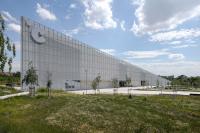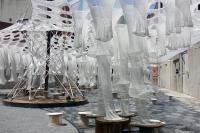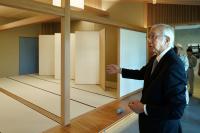Llull housing
Barcelona, Spain
Our purpose was to generate a sequence of public spaces that offers a clear continuity between the streets and the common areas of the apartments, trying to produce a positive interaction of the private and public programs.
Each of these programs is experiencing a gradual transition from public to private space,through the community areas. Starting from the street and the courtyard, the project offers a generous distributive corridor that can be used as a shared terrace for all the apartments. These zones (the terraces) lead to each of the homes, and also functions as an expansion of the inner programs. The modules of the apartments are divided in two different parts: one, which contains the “open” program, is like a “inner street” in straight continuity with the terrace, crossing perpendicularly the building (living room-kitchen-laundry). And the other, which also runs through the building perpendicularly, contains two bedrooms and a bathroom.
Between the interior area and the strictly private space (bedrooms and bathrooms) there is a 80 cm yellow strip that runs in all the way through from one façade to the other. Within this space, is placed a sequence of minimum technical infrastructure to make this place habitable (entrance-hall, lounge, infrastructure, access to private area, kitchen furniture, laundry room).
The apartments of the ground floor rotate 90 degrees, occupying half of the plan, creating two fully adapted homes in direct relation with the courtyard. The other half is facing Llull Street, dedicated to commercial programs related with the neighborhood.
The street façade at Llull Street is smooth and black, only interrupted by the large openings of the “inner streets”, and the yellow strips. The building is fully dedicated to rented flats. The black and yellow colors give a urban image as if it was, like a taxi, temporally being used.
The community courtyard façade wrinkles and creates shared open terraces that run across the façade. The materials used (galvanized aluminum) try to generate certain complicity with the materials of neighboring buildings, generating a coherent public space.
- Architects
- BOPBAA Arquitectura
- Location
- C/ Llull 420, 08019 Barcelona, Spain
- Year
- 2010










